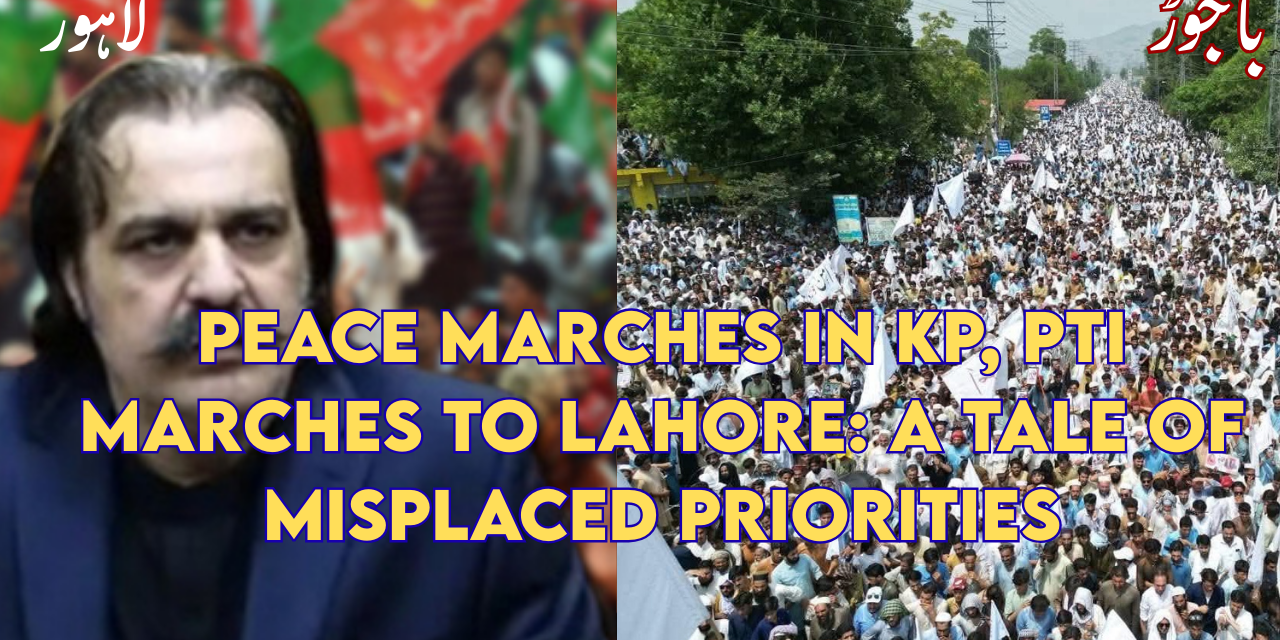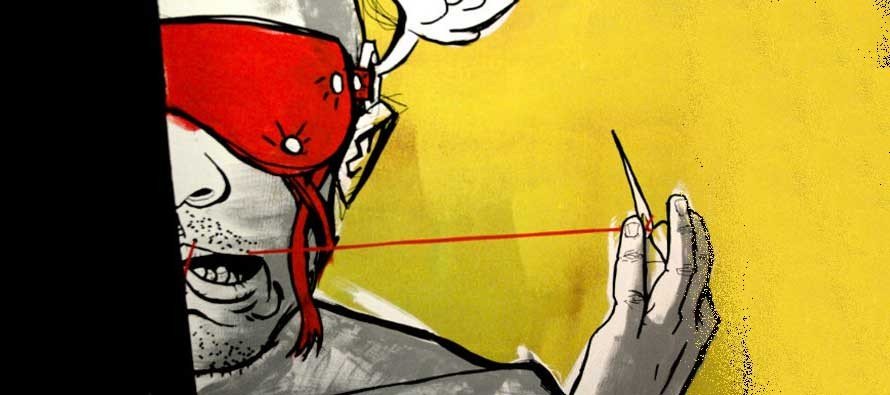By Fazal Khaliq
Khyber Pakhtunkhwa (KP), a province long plagued by violence and instability, stood at a poignant crossroads, grappling with a profound sense of abandonment and unrest. The assassination of Maulana Khanzeb, a respected leader of the Awami National Party (ANP) and a fervent advocate for peace, sparked widespread outrage and grief. Thousands of Pashtuns gathered in Bajaur for a peace march, demanding an end to terrorism, militarization, and state inaction in the face of targeted killings. On the same day, however, the elected representatives of the Pakistan Tehreek-e-Insaf (PTI), the ruling party in KP, were conspicuously absent, having traveled to Lahore to strategize a protest campaign for the release of their imprisoned leader, Imran Khan. This convergence of events highlights a troubling disconnect between the province’s leadership and its people, leaving the residents of KP feeling vulnerable to the mercy of terrorists while their elected officials prioritized a national political agenda.Maulana Khanzeb’s assassination on July 10, 2025, was a devastating blow to KP’s fragile hopes for peace. Known for his outspoken advocacy for Pashtun rights and his opposition to exploitative policies, such as the minerals bill that critics argued favored foreign interests over local welfare, Khanzeb was a symbol of resistance against systemic marginalization. His death, attributed to “unknown” gunmen, fueled suspicions of state complicity or negligence, as voiced in posts on X, where users lamented the silencing of a leader who dared to challenge the status quo. The peace march in Bajaur, attended by thousands, was not just a mourning of Khanzeb’s death but a collective cry against decades of violence, from the fallout of the U.S.-led war on terror to ongoing militant attacks in regions like Bajaur, Tirah, Khyber, Orakzai, and Waziristan. Protesters demanded accountability, chanting “No to terrorism” and “No to militarization,” yet their pleas were met with a deafening silence from mainstream media and, more critically, from their elected representatives.While the people of KP rallied for peace, the PTI leadership, led by Khyber Pakhtunkhwa Chief Minister Ali Amin Gandapur, convened in Lahore to launch an anti-government protest movement aimed at securing the release of Imran Khan, who has been incarcerated since August 2023. This high-profile meeting, held at a farmhouse in Raiwind, included PTI’s parliamentary committees from Punjab and KP, as well as senior leaders like Barrister Gohar Ali Khan. The campaign, described as a “do-or-die” effort set to peak by August 5, 2025—marking two years of Khan’s imprisonment—was framed as a response to perceived political oppression and electoral manipulation. Gandapur’s fiery rhetoric, accusing the military establishment of imposing an “undeclared martial law” and vowing a 90-day ultimatum for Khan’s release, underscored the intensity of PTI’s national agenda. However, this focus came at a critical cost: the absence of KP’s elected officials during a moment of acute crisis in their province.
The juxtaposition of these events paints a stark picture of neglect. While KP’s citizens faced the immediate threat of terrorism—exacerbated by Khanzeb’s killing and ongoing attacks in tribal areas—their representatives were physically and politically distant, prioritizing a Lahore-based movement over local governance. This absence was particularly glaring given PTI’s strong mandate in KP, where the party has governed since 2013, promising to address the province’s security and developmental challenges. Instead, the leadership’s decision to mobilize in Lahore, coupled with reports of police crackdowns on PTI workers in Punjab, suggests a strategic focus on national power dynamics rather than the urgent needs of their constituents. The people of KP, already radicalized by years of violence and perceived state betrayal, were left to confront their grief and fear alone, as posts on X noted the lack of response from both state media and PTI leaders.The situation is further complicated by the broader political and security context in KP. The province has endured decades of turmoil, from the fallout of the Soviet-Afghan War to the U.S.-led war on terror, which dragged the tribal belt into a vortex of militancy. The 2018 merger of the Federally Administered Tribal Areas (FATA) into KP promised integration and development, but many residents feel it has instead intensified state control and resource exploitation without addressing security concerns. Khanzeb’s criticism of policies like the minerals bill resonated with those who see KP’s resources being siphoned off while its people face daily threats. The opposition alliance in KP, now just 20 members short of a simple majority following the Supreme Court’s ruling against PTI’s reserved seats, adds to the political instability, raising fears of further governance disruptions.
The PTI’s focus on Imran Khan’s release, while significant for the party’s national strategy, risks alienating its KP base. The province’s residents, already disillusioned by years of unfulfilled promises, perceive a leadership vacuum at a time when unity and action are most needed. Gandapur’s absence during the Bajaur peace march, coupled with his provocative statements about self-defense and potential retaliation, further inflames tensions without offering concrete solutions to KP’s security crisis. Posts on X reflect this sentiment, with users expressing frustration that PTI’s agenda seems fixated on Khan’s release while “things are getting worse every day” in KP.The tragedy of July 13, 2025, underscores a deeper malaise in KP: a province caught between the aspirations of its people for peace and the political ambitions of its leaders. The assassination of Maulana Khanzeb was a call to action for a weary population, yet the absence of PTI’s elected representatives in Lahore signaled a prioritization of national politics over local suffering. To rebuild trust, PTI must balance its fight for Khan’s release with tangible efforts to address KP’s security and governance challenges. This includes engaging with peace marchers, investigating Khanzeb’s killing transparently, and prioritizing local security over provocative rhetoric. Without such steps, KP risks further radicalization, as warned by voices on X, and the chasm between the people and their leaders will only widen. The people of Khyber Pakhtunkhwa deserve more than to be left at the mercy of terrorists—they deserve leadership that stands with them in their darkest hours.
Khyber Pakhtunkhwa (KP), a province long plagued by violence and instability, stood at a poignant crossroads, grappling with a profound sense of abandonment and unrest. The assassination of Maulana Khanzeb, a respected leader of the Awami National Party (ANP) and a fervent advocate for peace, sparked widespread outrage and grief. Thousands of Pashtuns gathered in Bajaur for a peace march, demanding an end to terrorism, militarization, and state inaction in the face of targeted killings. On the same day, however, the elected representatives of the Pakistan Tehreek-e-Insaf (PTI), the ruling party in KP, were conspicuously absent, having traveled to Lahore to strategize a protest campaign for the release of their imprisoned leader, Imran Khan. This convergence of events highlights a troubling disconnect between the province’s leadership and its people, leaving the residents of KP feeling vulnerable to the mercy of terrorists while their elected officials prioritized a national political agenda.Maulana Khanzeb’s assassination on July 10, 2025, was a devastating blow to KP’s fragile hopes for peace. Known for his outspoken advocacy for Pashtun rights and his opposition to exploitative policies, such as the minerals bill that critics argued favored foreign interests over local welfare, Khanzeb was a symbol of resistance against systemic marginalization. His death, attributed to “unknown” gunmen, fueled suspicions of state complicity or negligence, as voiced in posts on X, where users lamented the silencing of a leader who dared to challenge the status quo. The peace march in Bajaur, attended by thousands, was not just a mourning of Khanzeb’s death but a collective cry against decades of violence, from the fallout of the U.S.-led war on terror to ongoing militant attacks in regions like Bajaur, Tirah, Khyber, Orakzai, and Waziristan. Protesters demanded accountability, chanting “No to terrorism” and “No to militarization,” yet their pleas were met with a deafening silence from mainstream media and, more critically, from their elected representatives.While the people of KP rallied for peace, the PTI leadership, led by Khyber Pakhtunkhwa Chief Minister Ali Amin Gandapur, convened in Lahore to launch an anti-government protest movement aimed at securing the release of Imran Khan, who has been incarcerated since August 2023. This high-profile meeting, held at a farmhouse in Raiwind, included PTI’s parliamentary committees from Punjab and KP, as well as senior leaders like Barrister Gohar Ali Khan. The campaign, described as a “do-or-die” effort set to peak by August 5, 2025—marking two years of Khan’s imprisonment—was framed as a response to perceived political oppression and electoral manipulation. Gandapur’s fiery rhetoric, accusing the military establishment of imposing an “undeclared martial law” and vowing a 90-day ultimatum for Khan’s release, underscored the intensity of PTI’s national agenda. However, this focus came at a critical cost: the absence of KP’s elected officials during a moment of acute crisis in their province.
The juxtaposition of these events paints a stark picture of neglect. While KP’s citizens faced the immediate threat of terrorism—exacerbated by Khanzeb’s killing and ongoing attacks in tribal areas—their representatives were physically and politically distant, prioritizing a Lahore-based movement over local governance. This absence was particularly glaring given PTI’s strong mandate in KP, where the party has governed since 2013, promising to address the province’s security and developmental challenges. Instead, the leadership’s decision to mobilize in Lahore, coupled with reports of police crackdowns on PTI workers in Punjab, suggests a strategic focus on national power dynamics rather than the urgent needs of their constituents. The people of KP, already radicalized by years of violence and perceived state betrayal, were left to confront their grief and fear alone, as posts on X noted the lack of response from both state media and PTI leaders.The situation is further complicated by the broader political and security context in KP. The province has endured decades of turmoil, from the fallout of the Soviet-Afghan War to the U.S.-led war on terror, which dragged the tribal belt into a vortex of militancy. The 2018 merger of the Federally Administered Tribal Areas (FATA) into KP promised integration and development, but many residents feel it has instead intensified state control and resource exploitation without addressing security concerns. Khanzeb’s criticism of policies like the minerals bill resonated with those who see KP’s resources being siphoned off while its people face daily threats. The opposition alliance in KP, now just 20 members short of a simple majority following the Supreme Court’s ruling against PTI’s reserved seats, adds to the political instability, raising fears of further governance disruptions.
The PTI’s focus on Imran Khan’s release, while significant for the party’s national strategy, risks alienating its KP base. The province’s residents, already disillusioned by years of unfulfilled promises, perceive a leadership vacuum at a time when unity and action are most needed. Gandapur’s absence during the Bajaur peace march, coupled with his provocative statements about self-defense and potential retaliation, further inflames tensions without offering concrete solutions to KP’s security crisis. Posts on X reflect this sentiment, with users expressing frustration that PTI’s agenda seems fixated on Khan’s release while “things are getting worse every day” in KP.The tragedy of July 13, 2025, underscores a deeper malaise in KP: a province caught between the aspirations of its people for peace and the political ambitions of its leaders. The assassination of Maulana Khanzeb was a call to action for a weary population, yet the absence of PTI’s elected representatives in Lahore signaled a prioritization of national politics over local suffering. To rebuild trust, PTI must balance its fight for Khan’s release with tangible efforts to address KP’s security and governance challenges. This includes engaging with peace marchers, investigating Khanzeb’s killing transparently, and prioritizing local security over provocative rhetoric. Without such steps, KP risks further radicalization, as warned by voices on X, and the chasm between the people and their leaders will only widen. The people of Khyber Pakhtunkhwa deserve more than to be left at the mercy of terrorists—they deserve leadership that stands with them in their darkest hours.





